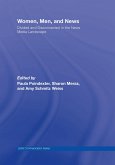Journalists and Knowledge Practices
Histories of Observing the Everyday in the Newspaper Age
Herausgeber: Ziemer, Hansjakob
Journalists and Knowledge Practices
Histories of Observing the Everyday in the Newspaper Age
Herausgeber: Ziemer, Hansjakob
- Gebundenes Buch
- Merkliste
- Auf die Merkliste
- Bewerten Bewerten
- Teilen
- Produkt teilen
- Produkterinnerung
- Produkterinnerung
This multi-disciplinary anthology provides new perspectives on the journalist's role in knowledge generation in the newspaper age - covering diverse topics from fake news to new technologies.
Andere Kunden interessierten sich auch für
![Black Everyday Lives, Material Culture and Narrative Black Everyday Lives, Material Culture and Narrative]() Shawn-Naphtali SobersBlack Everyday Lives, Material Culture and Narrative160,99 €
Shawn-Naphtali SobersBlack Everyday Lives, Material Culture and Narrative160,99 €![Laughing Back at Empire Laughing Back at Empire]() Angie WongLaughing Back at Empire73,99 €
Angie WongLaughing Back at Empire73,99 €![The Big Archive The Big Archive]() Sven SpiekerThe Big Archive27,99 €
Sven SpiekerThe Big Archive27,99 €![Going Dirty Going Dirty]() David MarkGoing Dirty134,99 €
David MarkGoing Dirty134,99 €![24/7 Politics 24/7 Politics]() Kathryn Cramer Brownell24/7 Politics26,99 €
Kathryn Cramer Brownell24/7 Politics26,99 €![News Across Media News Across Media]() News Across Media196,99 €
News Across Media196,99 €![Women, Men and News Women, Men and News]() Paula PoindexterWomen, Men and News172,99 €
Paula PoindexterWomen, Men and News172,99 €-
-
-
This multi-disciplinary anthology provides new perspectives on the journalist's role in knowledge generation in the newspaper age - covering diverse topics from fake news to new technologies.
Produktdetails
- Produktdetails
- Verlag: Taylor & Francis
- Seitenzahl: 294
- Erscheinungstermin: 11. November 2022
- Englisch
- Abmessung: 234mm x 156mm x 19mm
- Gewicht: 612g
- ISBN-13: 9780367630430
- ISBN-10: 0367630435
- Artikelnr.: 64617326
- Herstellerkennzeichnung
- Libri GmbH
- Europaallee 1
- 36244 Bad Hersfeld
- gpsr@libri.de
- Verlag: Taylor & Francis
- Seitenzahl: 294
- Erscheinungstermin: 11. November 2022
- Englisch
- Abmessung: 234mm x 156mm x 19mm
- Gewicht: 612g
- ISBN-13: 9780367630430
- ISBN-10: 0367630435
- Artikelnr.: 64617326
- Herstellerkennzeichnung
- Libri GmbH
- Europaallee 1
- 36244 Bad Hersfeld
- gpsr@libri.de
Hansjakob Ziemer received his PhD in Modern History from the Humboldt Universität zu Berlin in 2007, having also studied at Stanford and Oxford. He is senior research scholar and head of cooperation and communication at the Max Planck Institute for the History of Science, Berlin.
Part I
1. "I Was There Today": Fake Eyewitnessing and Journalistic Authority, from
Fontane to Relotius
Petra McGillen
2. "Have We La Grippe?": A Washington Case Study of Reporting the "Russian
Influenza" (1889-1890)
E. Thomas Ewing
3. Why Marmaduke Mizzle and the Good Ship Wabble Fooled No One: Fake News
and Metajournalistic Discourse in the Era of Journalistic
Professionalization
Andie Tucher
Part II
4. What it Means to Be a Journalist: Constructing the Journalistic Persona
at the End of the Weimar Republic
Hansjakob Ziemer
5. Secret Press Agents: When Journalists, Propagandists, and Spies Seemed
Indistinguishable
Heidi Tworek
Part III Technologies
6. Shortness and Speed in Journalism: The Electric Telegram and the
Circulation of Knowledge in Germany and France in 1860
Lisa Bolz
7. Fabricating Authentic Pictures: Press Photography as a Transnational
Mode of Observation at the Turn of the Twentieth Century
Malte Zierenberg
8. Inattentive Subjects: The Emergence of a Photojournalistic Norm
Annie Rudd
Part IV Knowledge Transfers
9. "Like a Modern Harun al Raschid": Herman Heijermans's 1910 Reports on
the Herzberge Mental Asylum in Berlin
Eric J. Engstrom
10. A Peasant among Peasants: Maurice Hindus's Transnational Revolutionary
Journalism
Elena Matveeva
11. Pop or Popularization? The Boundaries between Social Science and
Journalism
Susanne Schmidt
1. "I Was There Today": Fake Eyewitnessing and Journalistic Authority, from
Fontane to Relotius
Petra McGillen
2. "Have We La Grippe?": A Washington Case Study of Reporting the "Russian
Influenza" (1889-1890)
E. Thomas Ewing
3. Why Marmaduke Mizzle and the Good Ship Wabble Fooled No One: Fake News
and Metajournalistic Discourse in the Era of Journalistic
Professionalization
Andie Tucher
Part II
4. What it Means to Be a Journalist: Constructing the Journalistic Persona
at the End of the Weimar Republic
Hansjakob Ziemer
5. Secret Press Agents: When Journalists, Propagandists, and Spies Seemed
Indistinguishable
Heidi Tworek
Part III Technologies
6. Shortness and Speed in Journalism: The Electric Telegram and the
Circulation of Knowledge in Germany and France in 1860
Lisa Bolz
7. Fabricating Authentic Pictures: Press Photography as a Transnational
Mode of Observation at the Turn of the Twentieth Century
Malte Zierenberg
8. Inattentive Subjects: The Emergence of a Photojournalistic Norm
Annie Rudd
Part IV Knowledge Transfers
9. "Like a Modern Harun al Raschid": Herman Heijermans's 1910 Reports on
the Herzberge Mental Asylum in Berlin
Eric J. Engstrom
10. A Peasant among Peasants: Maurice Hindus's Transnational Revolutionary
Journalism
Elena Matveeva
11. Pop or Popularization? The Boundaries between Social Science and
Journalism
Susanne Schmidt
Part I
1. "I Was There Today": Fake Eyewitnessing and Journalistic Authority, from
Fontane to Relotius
Petra McGillen
2. "Have We La Grippe?": A Washington Case Study of Reporting the "Russian
Influenza" (1889-1890)
E. Thomas Ewing
3. Why Marmaduke Mizzle and the Good Ship Wabble Fooled No One: Fake News
and Metajournalistic Discourse in the Era of Journalistic
Professionalization
Andie Tucher
Part II
4. What it Means to Be a Journalist: Constructing the Journalistic Persona
at the End of the Weimar Republic
Hansjakob Ziemer
5. Secret Press Agents: When Journalists, Propagandists, and Spies Seemed
Indistinguishable
Heidi Tworek
Part III Technologies
6. Shortness and Speed in Journalism: The Electric Telegram and the
Circulation of Knowledge in Germany and France in 1860
Lisa Bolz
7. Fabricating Authentic Pictures: Press Photography as a Transnational
Mode of Observation at the Turn of the Twentieth Century
Malte Zierenberg
8. Inattentive Subjects: The Emergence of a Photojournalistic Norm
Annie Rudd
Part IV Knowledge Transfers
9. "Like a Modern Harun al Raschid": Herman Heijermans's 1910 Reports on
the Herzberge Mental Asylum in Berlin
Eric J. Engstrom
10. A Peasant among Peasants: Maurice Hindus's Transnational Revolutionary
Journalism
Elena Matveeva
11. Pop or Popularization? The Boundaries between Social Science and
Journalism
Susanne Schmidt
1. "I Was There Today": Fake Eyewitnessing and Journalistic Authority, from
Fontane to Relotius
Petra McGillen
2. "Have We La Grippe?": A Washington Case Study of Reporting the "Russian
Influenza" (1889-1890)
E. Thomas Ewing
3. Why Marmaduke Mizzle and the Good Ship Wabble Fooled No One: Fake News
and Metajournalistic Discourse in the Era of Journalistic
Professionalization
Andie Tucher
Part II
4. What it Means to Be a Journalist: Constructing the Journalistic Persona
at the End of the Weimar Republic
Hansjakob Ziemer
5. Secret Press Agents: When Journalists, Propagandists, and Spies Seemed
Indistinguishable
Heidi Tworek
Part III Technologies
6. Shortness and Speed in Journalism: The Electric Telegram and the
Circulation of Knowledge in Germany and France in 1860
Lisa Bolz
7. Fabricating Authentic Pictures: Press Photography as a Transnational
Mode of Observation at the Turn of the Twentieth Century
Malte Zierenberg
8. Inattentive Subjects: The Emergence of a Photojournalistic Norm
Annie Rudd
Part IV Knowledge Transfers
9. "Like a Modern Harun al Raschid": Herman Heijermans's 1910 Reports on
the Herzberge Mental Asylum in Berlin
Eric J. Engstrom
10. A Peasant among Peasants: Maurice Hindus's Transnational Revolutionary
Journalism
Elena Matveeva
11. Pop or Popularization? The Boundaries between Social Science and
Journalism
Susanne Schmidt








